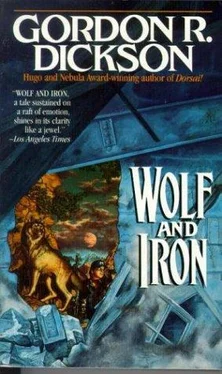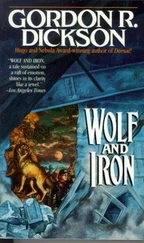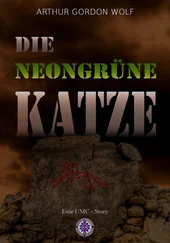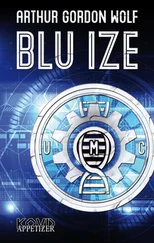Moreover, with a heavier gun he could bring down cattle—or even deer or mountain sheep, if he was lucky enough to stumble across them—to supplement whatever other food supplies he was carrying. Which brought him to his second greatest need, the proper type of food supplies. Canned goods were convenient, but heavy; and impractical to carry by backpack. What he really needed was some irradiated meat. Or, failing that, some powdered soups, plain flour, dried beans or such, and possibly bacon.
He had started with some supplies of that sort in his backpack, when he had finally made his escape alive from Stoketon. In fact, when he had packed to go, it had never actually occurred to him that the locals would not just let him leave, that they might really intend to kill him. In spite of his previous three months of near isolation in the community, he had still felt that after five years of living there, he was one of them.
But of course, he had never been one of them. What had led him to think he knew them was their casual politeness in the supermarket or the post office, plus the real friendship he had had with his housekeeper, Ardyce Prine. Mrs. Prine had lived there all her life, and, in her sixties, was in a position of belonging to the local authoritative generation.
But when the riots became too dangerous for him to risk traveling into Stoketon itself, to the building housing his study group—think tank, his Stoketon neighbors had called it—the local folks had begun to consider him an outsider they were better off without. There was, in fact, no real place for him in their lives. Particularly, as those lives began to shift toward an inward-looking economy, with local produce and meat being traded for locally made shoes and clothing. Jeebee produced nothing they needed.
While Ardyce had still been his housekeeper, they had tolerated him; but the day came when she did not appear; only a short stiff note, delivered by her grandson, saying that she could no longer work for him.
After that, he had felt the invisible enmity of his neighbors beginning to close about him. When he did try to leave and head west to Twin Peaks, he found them lying in wait for him with guns. At the time, he had not been able to understand why. But he understood now. If he had tried to leave naked, they might have let him go. But even the clothes he wore they now regarded as Stoketon property. Buel Mannerly, the druggist, had risen like a demon out of the darkness of the hillside, shotgun in hand, ready to bar his going; and only that lucky misshot from somewhere in the surrounding darkness had let Jeebee get away.
But then, once away, he had foolishly gone through his supplies like a spendthrift, not understanding then how hard it would be to replace them with anything edible at all, let alone more of their special and expensive kind.
He had learned differently the hard way, living off vegetables in abandoned gardens and what he could find in the ruins of isolated and looted houses. There was never much to be found in either kind of place. Now, three weeks later, at least part of him had become bearded, wise, and wary—ears listening, eyes moving, all the time; and a nose sensitive to any scent that might signal danger…
He fell to dreaming of the things he would want to trade for as soon as he found someplace where it was safe to do so.
In addition to a heavier rifle, he badly needed a spare pair of boots. The ones he wore would not last him all the way to Montana, if the bike broke down or he had to abandon or trade it off for any reason. Also—a revolver and ammunition for it would be invaluable. But of course to dream of a handgun like that was like dreaming of a slice of heaven. Weapons were the last thing anyone was likely to trade, these days.
He became so involved in his own thoughts that he found himself entering a curve between two low hills almost unexpectedly. The railroad track curved out of sight ahead between two heavy, grassy shoulders of open land and disappeared in the shadow of a clump of cottonwood trees that lay at the far end of the curve. The rain had stopped sometime before. He followed the tracks around, chugged into the shadow of the cottonwoods and out the other side—to find himself in a small valley, looking down at a railroad station, some sheep-loading pens, and a cluster of buildings, all less than half a mile away.
As it had when he had smelled the sheep, reflex led him to kill the motor of the bike and get both it and himself down on the ground beside the track. He lay where he was on the rough stones of the track ballast, staring through a screen of tall, dry grass at the buildings ahead and a little below him.
Even as he lay there, he knew his hitting the ground like this had almost certainly been a futile effort. If there was anyone in the little community ahead, they could have heard the whine of his electric motor even before it came into view from under the trees. He continued to lie there; but there was no sign of movement in or around the small community he had before him. Nor any sound, although the tin chimneys on several of the buildings were sending up thin streamers of gray smoke against the blue of a now mostly clear, late-afternoon sky.
Overall, what he was looking at seemed like some sort of sheep-loading station that had grown into a semivillage. There were two buildings down there that might be stores; but the majority of the structures he saw—frame buildings sided with gray unpainted boards—could be anything from homes to warehouses.
He rolled half on his side and twisted his body about to get at his backpack and take out the pair of binoculars. They were only four-power, actually a pair he had bought the previous Christmas to give to a friend in the study group; only to find that the friend, with his wife and son, were gone, hastily and in the night, before that holiday.
They were all he had been able to get his hands on before his own departure had been hurried by the antagonism of his neighbors; and they were something that in ordinary times he would not have bothered to put in his pack. But they did magnify, although the material of their lenses seemed hardly better than window glass.
He put them to his eyes now and squinted at the buildings. This time, with their help, after a long survey, he did discover one dog, apparently asleep beside three wooden steps leading up to a long, windowed building he had guessed might be a store. He stared at the dog for a long time, but it did not move.
Jeebee held the glasses to his eyes until they began to water. Then he lowered them and took his weight off his elbows, which had been badly punished, even through the leather jacket, by the gravel and stones beneath him. He tried to estimate what sort of place and people he might have stumbled upon.
If it had not been for the ascending smoke, the wild wishful thought came sliding into his head, he could almost believe he had stumbled across some community where disease or other cause had killed off the population—including the dogs. In which case, all he would have had to do was step down there and help himself to whatever property might be lying around.
The ridiculousness of such good fortune coming his way helped him push the fanciful notion aside. But certainly, the buildings seemed almost too quiet to be true. Of course, it was late in the afternoon now, and most of the people here could be peacefully indifferent to the arrival of some stranger.
But that, too, was a farfetched notion. No one in these days would be unconcerned about strange visitors. No, there were people below, just like those in Stoketon now and everywhere else. The only question was how they would react once they knew he was here. On that, he needed more evidence.
He lay and waited. In about twenty minutes the door of a storelike building—not the one where the dog lay—opened, and people began to come out. With their appearance, the dog was on his feet, in what, as far as Jeebee could tell from this distance, was a friendly greeting. The dog trotted toward them. They continued emerging until half a dozen men were out, to scatter toward and into other buildings. What they might all have been doing inside the one structure was a question impossible to answer. But it indicated an importance to the building.
Читать дальше












